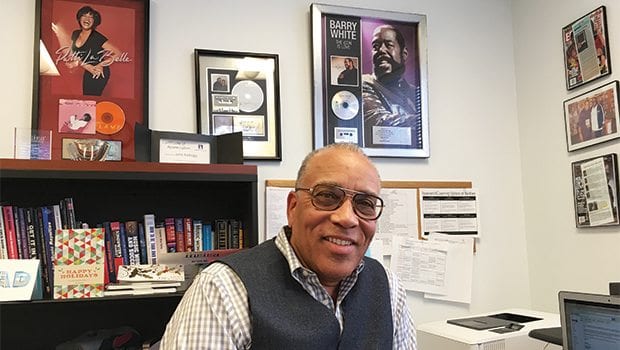Berklee College of Music professor’s online courses provide access for all

“Every time music gets played, someone gets paid,” John Kellogg is fond of saying.
The musician, lawyer, book author and Berklee College of Music professor follows the statement with his signature advice for anyone involved in music performance and production:
“You should get paid, not played.”
Kellogg’s music business wisdom has accrued over a multi-faceted working life that spans songwriting and singing with the band Cameo in the 1970s, decades as an entertainment lawyer representing star R & B and rap acts, and educating students at University of Colorado and now at Berklee, where he also is assistant chair of the music business/management department.
On the web
Free open online courses:
- Introduction to the Music Business: http://bit.ly/2kHNfgP
- Music Business Foundations: http://bit.ly/2l3RNtQ
Full Berklee courses/programs online: https://online.berklee.edu/courses
Book: “Take Care of Your Music Business” 2nd ed. by John P. Kellogg: http://amzn.to/2lCnvSd
Berklee students learn music business basics from Kellogg in for-credit classroom and online courses. But in 2014 Kellogg opened the door for people anywhere to be schooled in basic legal and business aspects of the music industry at no charge, by developing the first Massive Open Online Course (MOOC) on music business.
In his Berklee office, where the walls are lined with posters, photos of musician friends and clients and plaques from major stars whose songwriters or producers he represented, including Barry White, Patti LaBelle and Anita Baker, Kellogg spoke with the Banner recently about his career path and his open courses
“Having been a recording artist myself, and being so fortunate to have had experiences that I’ve had, I felt an obligation to try to give young people coming up a better understanding of the industry,” he explained.
He built the courses, and they came. So far, nearly 70,000 people from around the world have accessed “Introduction to the Music Business,” a six-week course offered four times per year on the EdX platform, or the shorter “Music Business Foundations” offered every few weeks on Coursera.
Educating from experience
Access to the MOOC video lectures and other course materials is open and free. For an optional fee (currently $49) students may have access to quizzes, assignments or discussions and can receive an official certificate of completion. The video lectures cover such topics as the history and future of the music industry, copyright basics, working with managers and agents and understanding recording agreements.
“The course opens their eyes to a lot of things they didn’t know about,” Kellogg said. As an example, many people are unaware of the importance of performance rights organizations, which help songwriters and publishers collect royalties for the use of their music.
Being savvy about such elements is only becoming more important in the 21st century as artists are recording music on their own, he said. “They are in essence acting as their own record companies, so they need to understand the rights and obligations they might have.”
Long before becoming a lawyer and a professor, Kellogg sang with The New Decade, a band he formed while in college at Syracuse University, and then with New York City-based Cameo, in that band’s early days when they were becoming known with singles like “Rigor Mortis” and “Funk Funk.”
In the late 70s, he gave up the singing and touring life for law school, returning to his home town of Cleveland and Case Western Reserve University School of Law.
Kellogg elaborated on this decision point in an interview last year with Syracuse University Magazine:
“At that time, many artists, especially black artists, were not getting the kinds of contracts they deserved. I believed that if I had a law degree, I could serve musicians and artists well by representing them.”
As a newly-minted entertainment lawyer, his first client was The O’Jays. This was a dream come true, as he had idolized the Cleveland-based soul quartet while growing up, he said, and had even set a goal while in law school of someday working with them. He went on to represent The O’Jays for the next 25 years, as well as other acts including rapper G. Dep and R & B artist Gerald Levert.
An evolving industry
In recent years, the music industry has undergone dramatic change, especially with shifts from record company domination to musicians self-publishing on the Internet and from traditional sales to Internet streaming and subscription models.
The good news is that musicians have far greater access to the market now, Kellogg says, though on the other hand, “Everyone has access, so it’s tough for your music to break through the clutter.”
When his first open course launched in 2014, Kellogg also released a second edition of his 2001 book, “Take Care of Your Music Business,” updated to cover evolving 21st-century technology and business models and related legal concepts. He predicts it will be time for a third edition soon, given the rapid pace of change.
“It’s a very exciting time,” he said.
The next “Introduction to the Music Business” session on EdX starts April 17, with course registration open in early March. Self-paced “Music Business Foundations” sessions on Coursera begin every few weeks.






